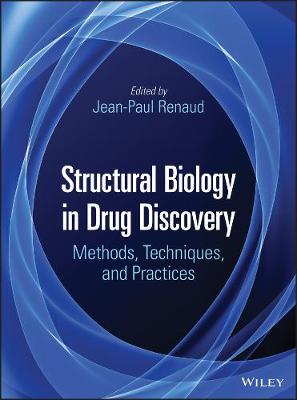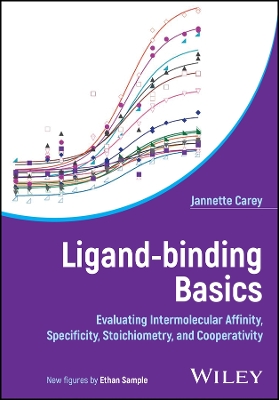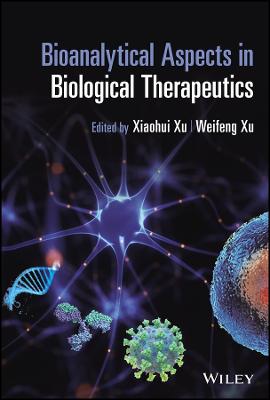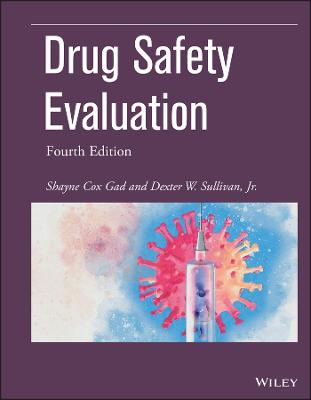Structural Biology in Drug Discovery
 -15%
portes grátis
-15%
portes grátis
Structural Biology in Drug Discovery
Methods, Techniques, and Practices
Renaud, Jean-Paul
John Wiley & Sons Inc
03/2020
688
Dura
Inglês
9781118681015
15 a 20 dias
1750
Descrição não disponível.
List of Contributors
Preface
Chapter 01: The Evolving Role of Structural Biology in Drug Discovery
Chapter 02: A Structural View on Druggability: Experimental and Computational Approaches
Chapter 03: Structural Chemogenomics: Profiling Protein-Ligand Interactions in Polypharmacological Space
Chapter 04: Fragment-Based Ligand Discovery
Chapter 05: Combining Structural, Thermodynamic and Kinetic Information to Drive Hit-to-Lead Progression
Chapter 06: Allostery as Structure-Encoded Collective Dynamics: Significance in Drug Design
Chapter 07: Biophysical Assessment of Target Protein Quality in Structure-Based Drug discovery
Chapter 08: An Industrial Perspective on Protein-Ligand Complex Crystallization
Chapter 09: Membrane Protein Crystallization
Chapter 10: High-throughput Macromolecular Crystallography in Drug Discovery: Evolving in the Midst of Revolutions
Chapter 11: Assessment of Crystallographic Structure Quality and Protein - Ligand Complex Structure Validation
Chapter 12: Complementary Information from Neutron Crystallography Studies
Chapter 13: Determination of Protein Structure and Dynamics by NMR: State of the Art and Application to the Characterization of Biotherapeutics
Chapter 14: NMR Studies of Protein - Small Molecule Interactions for Drug Discovery
Chapter 15: Computational Structural Biology for Drug Discovery: Power and Limitations
Chapter 16: The Role of Structural Biology in Kinase Inhibitors Drug Discovery Success
Chapter 17: Serine Proteinases from the Blood Coagulation Cascade
Chapter 18: Epigenetic Proteins as Emerging Drug Targets
Chapter 19: Impact of Recently Determined Crystallographic Structures of GPCRs on Drug Discovery
Chapter 20: Targeting Protein-Protein Interactions Perspective
Chapter 21: Mass Spectrometry-Based Strategies for Therapeutic Antibodies Extensive Characterization and Optimization (OptimAbs)
Chapter 22: Integrating Evolution of Drug Resistance into Drug Discovery: Lessons from the Viral Proteases of HIV-1 and HCV
Chapter 23: A Comprehensive Review on Mycobacterium Tuberculosis Targets and Drug Development from a Structural Perspective
Chapter 24: Using Crystal Structures of Drug-Metabolizing Enzymes in Mechanism-Based Modeling for Drug Design
Chapter 25: Intrinsically Disordered Proteins (IDPs): Targets for the Future?
Chapter 26: Cryo-electron Microscopy as a Tool for Drug Discovery in the Context of Integrative Structural Biology
Chapter 27: Application of Hard-X-ray Free-electron Lasers for Static and Dynamic Processes in Structural Biology
Preface
Chapter 01: The Evolving Role of Structural Biology in Drug Discovery
Chapter 02: A Structural View on Druggability: Experimental and Computational Approaches
Chapter 03: Structural Chemogenomics: Profiling Protein-Ligand Interactions in Polypharmacological Space
Chapter 04: Fragment-Based Ligand Discovery
Chapter 05: Combining Structural, Thermodynamic and Kinetic Information to Drive Hit-to-Lead Progression
Chapter 06: Allostery as Structure-Encoded Collective Dynamics: Significance in Drug Design
Chapter 07: Biophysical Assessment of Target Protein Quality in Structure-Based Drug discovery
Chapter 08: An Industrial Perspective on Protein-Ligand Complex Crystallization
Chapter 09: Membrane Protein Crystallization
Chapter 10: High-throughput Macromolecular Crystallography in Drug Discovery: Evolving in the Midst of Revolutions
Chapter 11: Assessment of Crystallographic Structure Quality and Protein - Ligand Complex Structure Validation
Chapter 12: Complementary Information from Neutron Crystallography Studies
Chapter 13: Determination of Protein Structure and Dynamics by NMR: State of the Art and Application to the Characterization of Biotherapeutics
Chapter 14: NMR Studies of Protein - Small Molecule Interactions for Drug Discovery
Chapter 15: Computational Structural Biology for Drug Discovery: Power and Limitations
Chapter 16: The Role of Structural Biology in Kinase Inhibitors Drug Discovery Success
Chapter 17: Serine Proteinases from the Blood Coagulation Cascade
Chapter 18: Epigenetic Proteins as Emerging Drug Targets
Chapter 19: Impact of Recently Determined Crystallographic Structures of GPCRs on Drug Discovery
Chapter 20: Targeting Protein-Protein Interactions Perspective
Chapter 21: Mass Spectrometry-Based Strategies for Therapeutic Antibodies Extensive Characterization and Optimization (OptimAbs)
Chapter 22: Integrating Evolution of Drug Resistance into Drug Discovery: Lessons from the Viral Proteases of HIV-1 and HCV
Chapter 23: A Comprehensive Review on Mycobacterium Tuberculosis Targets and Drug Development from a Structural Perspective
Chapter 24: Using Crystal Structures of Drug-Metabolizing Enzymes in Mechanism-Based Modeling for Drug Design
Chapter 25: Intrinsically Disordered Proteins (IDPs): Targets for the Future?
Chapter 26: Cryo-electron Microscopy as a Tool for Drug Discovery in the Context of Integrative Structural Biology
Chapter 27: Application of Hard-X-ray Free-electron Lasers for Static and Dynamic Processes in Structural Biology
Este título pertence ao(s) assunto(s) indicados(s). Para ver outros títulos clique no assunto desejado.
structural biology, drug discovery, drug development, crystallization, X-ray diffraction, NMR, mass spectrometry, and computational chemistry, protein dynamics, structure-based chemogenomics, polypharmacology, fragment-based drug design, biophysics, biotherapeutics
List of Contributors
Preface
Chapter 01: The Evolving Role of Structural Biology in Drug Discovery
Chapter 02: A Structural View on Druggability: Experimental and Computational Approaches
Chapter 03: Structural Chemogenomics: Profiling Protein-Ligand Interactions in Polypharmacological Space
Chapter 04: Fragment-Based Ligand Discovery
Chapter 05: Combining Structural, Thermodynamic and Kinetic Information to Drive Hit-to-Lead Progression
Chapter 06: Allostery as Structure-Encoded Collective Dynamics: Significance in Drug Design
Chapter 07: Biophysical Assessment of Target Protein Quality in Structure-Based Drug discovery
Chapter 08: An Industrial Perspective on Protein-Ligand Complex Crystallization
Chapter 09: Membrane Protein Crystallization
Chapter 10: High-throughput Macromolecular Crystallography in Drug Discovery: Evolving in the Midst of Revolutions
Chapter 11: Assessment of Crystallographic Structure Quality and Protein - Ligand Complex Structure Validation
Chapter 12: Complementary Information from Neutron Crystallography Studies
Chapter 13: Determination of Protein Structure and Dynamics by NMR: State of the Art and Application to the Characterization of Biotherapeutics
Chapter 14: NMR Studies of Protein - Small Molecule Interactions for Drug Discovery
Chapter 15: Computational Structural Biology for Drug Discovery: Power and Limitations
Chapter 16: The Role of Structural Biology in Kinase Inhibitors Drug Discovery Success
Chapter 17: Serine Proteinases from the Blood Coagulation Cascade
Chapter 18: Epigenetic Proteins as Emerging Drug Targets
Chapter 19: Impact of Recently Determined Crystallographic Structures of GPCRs on Drug Discovery
Chapter 20: Targeting Protein-Protein Interactions Perspective
Chapter 21: Mass Spectrometry-Based Strategies for Therapeutic Antibodies Extensive Characterization and Optimization (OptimAbs)
Chapter 22: Integrating Evolution of Drug Resistance into Drug Discovery: Lessons from the Viral Proteases of HIV-1 and HCV
Chapter 23: A Comprehensive Review on Mycobacterium Tuberculosis Targets and Drug Development from a Structural Perspective
Chapter 24: Using Crystal Structures of Drug-Metabolizing Enzymes in Mechanism-Based Modeling for Drug Design
Chapter 25: Intrinsically Disordered Proteins (IDPs): Targets for the Future?
Chapter 26: Cryo-electron Microscopy as a Tool for Drug Discovery in the Context of Integrative Structural Biology
Chapter 27: Application of Hard-X-ray Free-electron Lasers for Static and Dynamic Processes in Structural Biology
Preface
Chapter 01: The Evolving Role of Structural Biology in Drug Discovery
Chapter 02: A Structural View on Druggability: Experimental and Computational Approaches
Chapter 03: Structural Chemogenomics: Profiling Protein-Ligand Interactions in Polypharmacological Space
Chapter 04: Fragment-Based Ligand Discovery
Chapter 05: Combining Structural, Thermodynamic and Kinetic Information to Drive Hit-to-Lead Progression
Chapter 06: Allostery as Structure-Encoded Collective Dynamics: Significance in Drug Design
Chapter 07: Biophysical Assessment of Target Protein Quality in Structure-Based Drug discovery
Chapter 08: An Industrial Perspective on Protein-Ligand Complex Crystallization
Chapter 09: Membrane Protein Crystallization
Chapter 10: High-throughput Macromolecular Crystallography in Drug Discovery: Evolving in the Midst of Revolutions
Chapter 11: Assessment of Crystallographic Structure Quality and Protein - Ligand Complex Structure Validation
Chapter 12: Complementary Information from Neutron Crystallography Studies
Chapter 13: Determination of Protein Structure and Dynamics by NMR: State of the Art and Application to the Characterization of Biotherapeutics
Chapter 14: NMR Studies of Protein - Small Molecule Interactions for Drug Discovery
Chapter 15: Computational Structural Biology for Drug Discovery: Power and Limitations
Chapter 16: The Role of Structural Biology in Kinase Inhibitors Drug Discovery Success
Chapter 17: Serine Proteinases from the Blood Coagulation Cascade
Chapter 18: Epigenetic Proteins as Emerging Drug Targets
Chapter 19: Impact of Recently Determined Crystallographic Structures of GPCRs on Drug Discovery
Chapter 20: Targeting Protein-Protein Interactions Perspective
Chapter 21: Mass Spectrometry-Based Strategies for Therapeutic Antibodies Extensive Characterization and Optimization (OptimAbs)
Chapter 22: Integrating Evolution of Drug Resistance into Drug Discovery: Lessons from the Viral Proteases of HIV-1 and HCV
Chapter 23: A Comprehensive Review on Mycobacterium Tuberculosis Targets and Drug Development from a Structural Perspective
Chapter 24: Using Crystal Structures of Drug-Metabolizing Enzymes in Mechanism-Based Modeling for Drug Design
Chapter 25: Intrinsically Disordered Proteins (IDPs): Targets for the Future?
Chapter 26: Cryo-electron Microscopy as a Tool for Drug Discovery in the Context of Integrative Structural Biology
Chapter 27: Application of Hard-X-ray Free-electron Lasers for Static and Dynamic Processes in Structural Biology
Este título pertence ao(s) assunto(s) indicados(s). Para ver outros títulos clique no assunto desejado.







